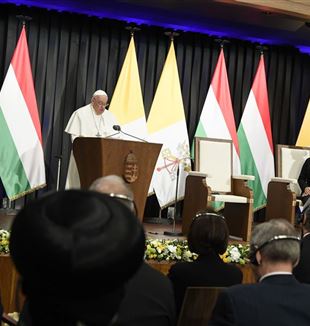
Pope Francis: "It is vital to recover the European spirit"
War in neighboring Ukraine, welcoming migrants, the value of life. The three central themes of Pope Francis' trip to Hungary, in the heart of the Old Continent. Here is his address to the authorities upon his arrival in Budapest.Pope Francis' trip to Budapest was loaded with reminders for tired old Europe: the war in neighboring Ukraine, the welcoming of migrants, the value of life. On these issues, all of which were already addressed in his first speech on Hungarian soil - with the authorities, civil society and the diplomatic corps delivered on Friday, April 28 - the Pope was very clear. “That passionate quest of a politics of community and the strengthening of multilateral relations seems a wistful memory from a distant past,” he said, “We seem to be witnessing the sorry sunset of that choral dream of peace, as the soloists of war now take over […] It is vital, then, to recover the European spirit.” And quoting one of the Founding Fathers of a united Europe, Frenchman Robert Schumann, Francis wondered, "I ask myself, thinking not least of war-torn Ukraine, where are creative efforts for peace?”
Another issue the Pope insisted on is that of "ideological colonization" and the right to life. Europe, he said, must not be "hostage to its parts, neither falling prey to self-referential forms of populism," but neither must it turn into "a fluid, if not vapid, ‘supranationalism’ that loses sight of the life of its peoples. This is the baneful path taken by those forms of ‘ideological colonization’ that would cancel differences, as in the case of the so-called gender theory, or that would place before the reality of life reductive concepts of freedom, for example by vaunting as progress a senseless ‘right to abortion’, which is always a tragic defeat."Finally, referring to Hungary's "history of sanctity" and the Magyar Constitution itself, Francis reminded not only Prime Minister Viktor Orbán but the entire Continent that "ehen we think of Christ present in so many of our brothers and sisters who flee in desperation from conflicts, poverty and climate change, we feel bound to confront the problem without excuses and delay. It needs to be confronted together, as a community, not least because, in the present situation, its effects will be felt, sooner or later, by all of us. It is urgent then, as Europe, to work for secure and legal corridors and established processes for meeting an epochal challenge that is ineluctable and needs to be acknowledged, in order to prepare a future that, unless it is shared, will not exist. This challenge especially calls for a response on the part of those who are followers of Jesus and wish to imitate the example of the witnesses of the Gospel." (Stefano Filippi)
Below is the text of the first address given by the Pope on his three-day trip to Hungary. Budapest, former Carmelite Monastery. Friday, April 28, 2023
Madam President of the Republic,
Mr Prime Minister,
Distinguished Members of Government and the Diplomatic Corps,
Illustrious Authorities and Representatives of Civil Society,
Ladies and Gentlemen!
I greet you all most cordially and I thank Madam President for her welcome and her kind and profound words. Politics was born of the city, the polis, and the practical desire to live together in unity, ensuring rights and respecting obligations. Few cities help us realize this as does Budapest, for it is not only a noble and lively metropolis, but also a theatre of great historical events. Having witnessed momentous events in the past, it is called to take a leading role in the present and in the future. Here, as one of your great poets wrote, “we are tenderly embraced by the Danube, which is our past, our present and our future” (A. JÓZSEF, The Danube). I would now like to share a few thoughts with you, taking as my starting point Budapest itself: a city of history, a city of bridges and a city of saints.
1. A city of history. This capital has ancient origins, as evidenced by its remains from Celtic and Roman times. Its splendour, however, is linked to the modern period, when it was the capital of the Austro-Hungarian Empire in those decades of peace known as the belle époque, extending from the years of its establishment to the outbreak of the First World War. Born in peacetime, it has also experienced brutal conflicts: not only the invasions of ages past, but in more recent times, acts of violence and oppression perpetrated by the Nazi and Communist dictatorships. How can we forget the events of 1956? And during the Second World War, tens of thousands of its inhabitants were deported, with the remaining population of Jewish origin enclosed in the ghetto and subjected to mass murders. Yet those days were also marked by the heroism of many of the “righteous” – I think of the Nuncio Angelo Rotta, for example – and later by the great resilience and commitment shown in the work of rebuilding. As a result, Budapest today is one of the European cities with the largest Jewish population, the heart of a country that acknowledges the value of freedom and, having paid so great a toll to the dictatorships, is conscious of its mission to preserve the treasure of democracy and the dream of peace [...]
Continue reading on vatican.va